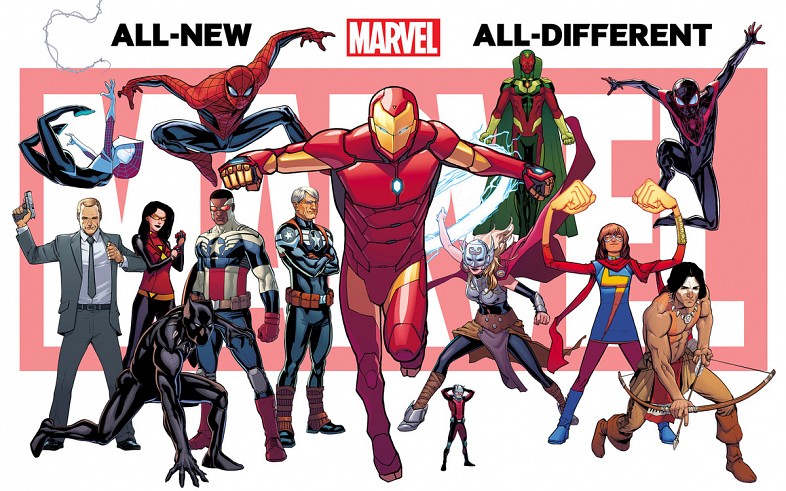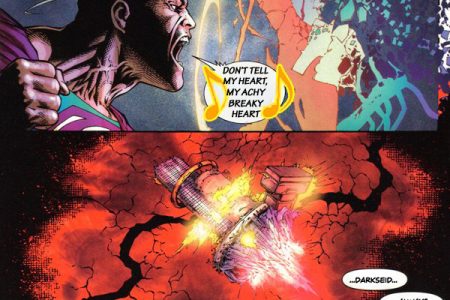With the news of DC Comics Rebirth (they are keen to state that it’s NOT a reboot, but c’mon …) relaunching the DC universe of titles with new #1 issues after 52 issues of the DC New 52 reboot of the entire DC universe (which happened only back in September 2011), readers of comic books must be wondering: what the hell is going on with mainstream comic book universes? What is the point of reading these books when everything is going to change and nothing matters?
Rebooting/relaunching comic book universes is not a new phenomenon – the Silver Age of comics started in October 1956 with the publication of Showcase #4 and the modern version of the Flash, the success of which would lead to modern versions of many DC superheroes, effectively revitalising the DC universe in which only Batman, Superman and Wonder Woman had titles of which they were the star. DC did it again in 1986, with Crisis on Infinite Earths streamlining the 50-year history and relaunching new versions of various characters.
Marvel’s Ultimate Universe, which saw the release of Ultimate Spider-Man in 2000, Ultimate X-Men in 2001 and The Ultimates in 2002, was effectively a reboot of the Marvel universe but in parallel with the rest of the Marvel universe. Marvel kept on publishing both universes until finally admitting that the Ultimate experiment had run its course and absorbed the successes (Miles Morales as Spider-Man, Samuel L Jackson as Nick Fury) into the ‘proper’ Marvel universe, albeit in the All-New, All Different Marvel universe that launched out of the Secret Wars title (even if it was a slightly botched launch because Secret Wars overran so long that it was still coming out while all the new titles were starting). And this was after Marvel, in response to DC’s success with their New 52, relaunched their ongoing books with new #1 issues as Marvel NOW! in October 2012 and then All-New Marvel NOW! a year later.
The comic book industry is in strange times. The films based on comic book properties are massive successes but there hasn’t been a comparative increase in the sales of comic books. Caveat: It’s hard to be completely accurate with the sales of comic books, with most data coming from Diamond, which is how many books Diamond sells directly to comic book shops in the US, and doesn’t take into account comic books sold in the rest of the world or digital sales. However, these numbers are a good indicator and, despite the fact that sales have increased since the extreme low prior to the DC New 52 relaunch, the top titles sell in the region of 100,000 to 150,000, and that’s only for the top ten, with the rest of the top 50 selling in the 30,000 to 60,000 range. Note that this doesn’t take into account the sales of trade paperbacks, but that’s a different issue because the trade relies on the sale of individual issues as a loss-leader.
Comic book culture dominates geek culture, with the films and the television series and cosplay seemingly everywhere, but there is still a limited audience of people who buy individual issues of a comic book on a weekly basis. Comic book readers are conditioned to this, but the general audience doesn’t know and doesn’t care – the mythical idea that everyone will buy comics if there is something for everyone and they know about it is ridiculous and the sooner it is removed from any discussion about the future of comic books the better. The rest of the world is not going to start buying monthly comic books for entertainment when they cost so much and provide so little value for money when they have film and TV providing a more satisfying and cheaper version of the same concepts. There is also the fact that, unless you get into the mindset when you’re younger, reading comic books is a unique medium that requires different comprehension and appreciation, something that the average person is not going to put the effort into acquiring.
There is also the fact that comic books are inherently something that are not designed for casual dipping into – it’s a commitment and conscious decision to wade into titles with years of history, or which have a different status quo from the mainstream version that the majority of people know (e.g. for the majority of people who were aware of Green Lantern from TV, which vastly exceeded the people who knew Green Lantern from the comic books, John Stewart was Green Lantern because of the Justice League animated series, not a dull white man in an animated suit). Even newer characters exist within a universe filled with a massive number of other characters and a shared history of concepts and events, something that appeals to a comic book fan but is a barrier to someone not conditioned to it or who doesn’t care and just wants a story like the film or the TV show.

Constantly relaunching with #1 issues might create a temporary boost in sales because everyone likes something new and shiny, but inevitably numbers decline because it’s not sustainable. Marvel has been using the ‘new creators, new season’ model for their big sellers for a while now, justifying the #1 issue with a new creative team providing a jumping-on point; this has some validity because there is generally a different approach between creative teams in the modern comic book industry, instead of the old days where there was a belief in maintaining continuity in these multi-decade titles. However, it has reached a law of diminishing returns where everything has a new launch so often that it doesn’t mean anything and the years of continuing history are irrelevant – the only option left soon will be to have a new issue #1 with every issue.
Conversely, DC has tried a different approach by forcing out issues consistently on a monthly basis with little care for creative vision apart from a few titles – as long as the book gets out the door on schedule, it doesn’t seem to matter to DC who it writing or drawing the book as long as it is published. This has led to unhappy creators feeling undervalued, with the exception of some of the big names, books being cancelled because they’re not selling well because they’re not very good, multiple crossovers, and a general sense that only the big titles matter (Batman, Superman, Wonder Woman, Justice League).
This doesn’t consider the fact that comic books are expensive, that it is an industry mainly created by and for white men, that it is still mostly stuck with characters created 50 years ago, that the physical version requires comic book shops to order them several months in advance and can’t return them. Comic books are generally better than they were – the writers, artists, colourists, letters, editors are top quality; the sophistication and quality of comic books are better; the range and diversity of characters are better – but the industry is still relatively small and should stop hankering for the sales during the Second World War. IT’S NEVER GOING TO HAPPEN.
Another factor related to expense is reluctance to try new things and feel the experience of a shared universe of characters. When I started buying comic books, they cost 30 pence an issue, which made it an affordable hobby where I could try new titles and concepts while still feeling invested in the entire fictional world of superheroes. Even with digital comics allowing people to shop for titles more easily, there is no way that the average comic book fan can afford to invest in these shared universes in the same way; also, the risk of trying something new is too expensive, meaning that new concepts don’t get the chance to develop an audience and people stick to the main titles with the decades-old characters that are the major players. Constantly producing new #1s as supposed jumping-on points isn’t going change this – stagnation will set in, nobody will believe that the latest relaunch/reboot/renumbering event is going to mean anything, and the mainstream comic book industry will contract even more so that it will only exist to maintain franchise characters.
I don’t have the answers for this problem – I wish I did – but I do have genuine affection for comic books still: I review comic books that publishers kindly send me, I buy creator-owned titles at Image and Dark Horse, I read forests of trade paperbacks from libraries, and I still have my vast collection of old comic books. I sincerely hope that the industry survives, even if I don’t buy monthly comics from DC or Marvel any more, so that as many people as possible get to experience the joy of comic books and the fantastic stories in massive shared universes. I’m just a little worried about it …




